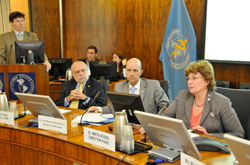|
From:TheBahamasWeekly.com Caribbean News
Washington, D.C. - Three
Latin American countries are working to strengthen their management of
drugs for the treatment of HIV/AIDS, as part of a pilot project
supported by the Pan American Health Organization/World Health
Organization (PAHO/WHO) and the Global Fund to Fight AIDS, Tuberculosis,
and Malaria. The project aims, among other things, to prevent shortages
of antiretroviral drugs, a problem that has affected a number of
countries in Latin America and the Caribbean.
Guatemala, Honduras, and the Dominican Republic are participating in
the pilot project, which seeks to improve supply systems for HIV/AIDS
medications as well as transparency in drug management information.
Other Latin American countries have asked to join the project in the
coming months.
“The purchase and efficient management of antiretroviral drugs in the
region is indispensable to guaranteeing sustainable access to these
drugs,” said James Fitzgerald, PAHO/WHO senior advisor on essential
medicines and biologicals. “However, some countries in the Americas have
experienced episodes of shortages of antiretrovirals, which has led to
interruption of treatment for HIV/AIDS. Strengthening antiretroviral
drug management systems is a public health priority.”
Antiretroviral drug shortages—known as “stock-outs”—can result in
dangerous interruptions in treatment for people with HIV/AIDS, in some
cases leading to drug resistance, requiring review and changes in their
treatment.
Latin America and the Caribbean have higher levels of antiretroviral
coverage than any other developing region, however, countries face
challenges in maintaining and increasing coverage.
Nearly 68% of people in Latin America who need antiretroviral therapy
are receiving it, as are 67% in the Caribbean. However, in 2011 more
than half of Latin American and Caribbean countries (14 of 26 countries,
or 54%) reported at least one stock-out of antiretrovirals. These
episodes were largely the result of problems with bidding, purchasing,
and distribution processes or complications with antiretroviral
production.
At the start of the pilot project, PAHO/WHO, in cooperation with the
Global Fund, sponsored an exchange of information among national health
authorities, strategic partners, and civil society representatives in
each country, to analyze problems that could affect the effective supply
of HIV/AIDS drugs. Several strategies have been identified to reduce
the risk of shortages and ensure continuity of treatment for people with
HIV/AIDS.
To implement antiretroviral drug monitoring systems, the three
countries are using the PAHO/WHO Regional Platform on Access and
Innovation for Health Technologies (PRAIS in Spanish), which provides
online tools to systematize and share information.
Through PRAIS, countries can create and exchange lists of
antiretroviral drugs, monitor their stocks and consumption, and collect
data on drug availability. They can also use an early warning system
that provides at least six months advance notice of a potential problem
in the antiretroviral drug supply.
The platform also makes it possible for countries to handle information
transparently, forecast antiretroviral drug needs, reschedule
procurement, and search for efficient purchasing mechanisms and
affordable prices, which helps prevent the need for emergency purchases.
The platform also allows countries to share this information and
exchange drugs among themselves, if needed.
Antiretroviral therapy consists of the combination of at least three
antiretroviral drugs to suppress the HIV virus and halt progression of
the disease. Currently, patients must take these drugs every day for the
rest of their lives.
PAHO, founded in 1902, is the oldest international public health
organization in the world. It works with its member countries to improve
the health and the quality of life of the people of the Americas. It
also serves as the Regional Office for the Americas of WHO.
|
